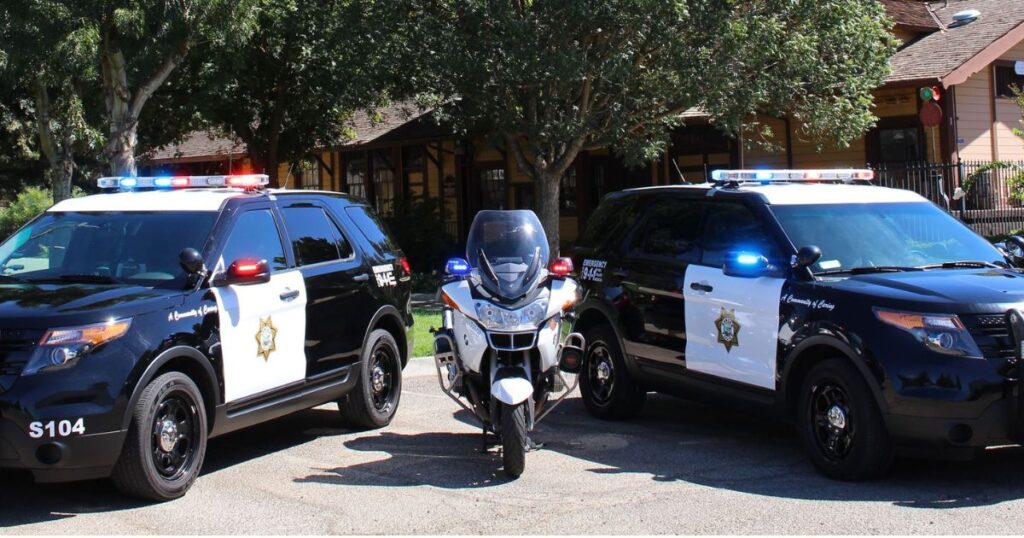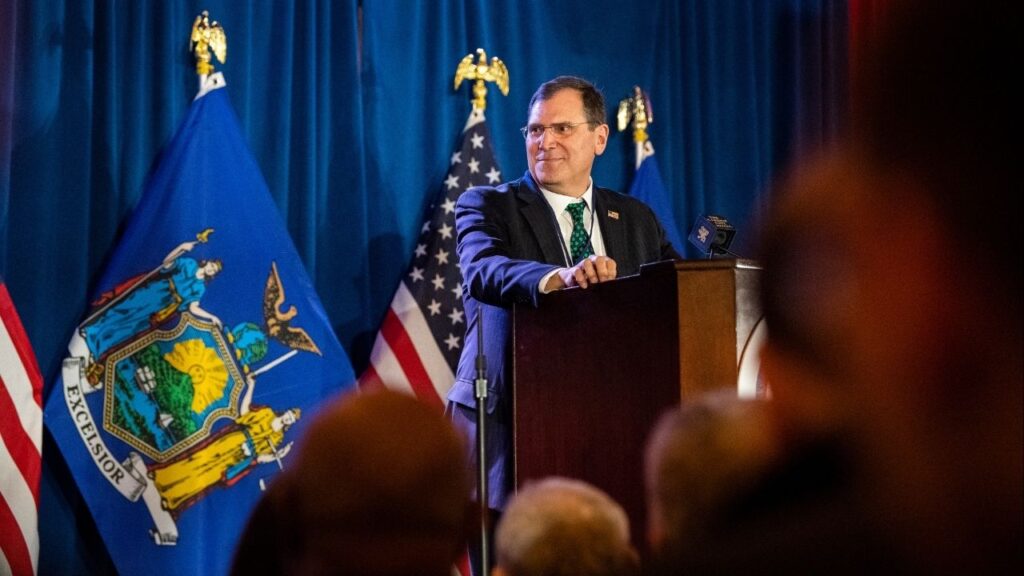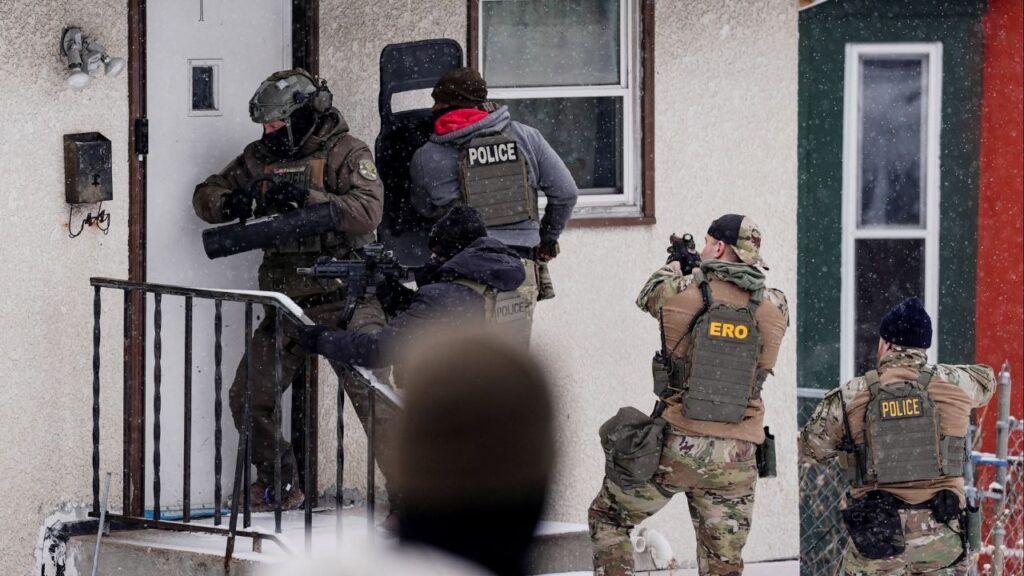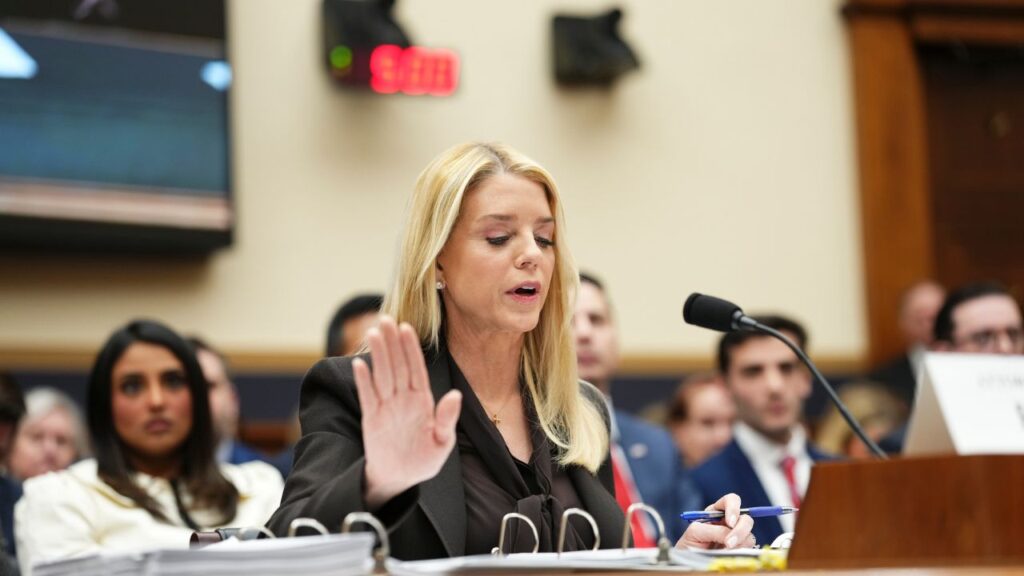Student protests urge universities to divest from companies profiting from conflicts. (AP/Mary Altaffer)

- Chalked slogans outside The New School demand divestment from companies profiting from the Israel-Hamas war.
- Campus protests urge colleges to divest endowments from controversial investments.
- External experts manage endowment investments, limiting universities' control.
Share
|
Getting your Trinity Audio player ready...
|
“Divest from death” read the bubble letters written in chalk on the sidewalk on Tuesday outside of The New School in New York City.
The slogan articulates one of the demands of the antiwar protests on campuses which call on colleges or universities to divest their endowments from companies profiting from the Israel-Hamas war.
Campaigns to pressure universities to divest for political or ethical reasons go back decades, at least to the 1970s when students pressured schools to withdraw from investments that benefited South Africa under apartheid rule. More recently, in the early aughts, schools made rules barring investments in things like alcohol, tobacco and gambling, according to a report from the National Association of College and University Business Officers (NACUBO) and Commonfund.
By the beginning of the next decade, a sizeable minority of endowments were including some environmental, social and governance criteria in their portfolios, which expands the factors considered in weighing the value of an investment beyond profits and losses.
College and university endowments hold hundreds of billions of dollars in assets, for example, with Columbia University’s reaching $13.6 billion in 2023. Now, campus protests are bringing attention to who controls university endowments and how decisions about those investments get made.
What Are Endowments?
Endowments are the holdings and investments that institutions of higher education, foundations and some nonprofits manage as a kind of perpetual savings account. Many use the financial returns generated by those assets each year to help fund the institution’s ongoing work. Donors often give to institution’s endowments to ensure it will have resources well into the future.
Who Manages the Investments of Endowments?
Many schools from the largest to the smallest work with outside investment managers, like investment banks or hedge funds or specialized firms that have access to investing vehicles that aren’t available to retail investors, said Todd Ely, associate professor in the School of Public Affairs at the University of Colorado Denver.
“Colleges and universities have fairly limited discretion in the actual specific investments that their endowment funds are going towards because they’ve hired these external experts to make those decisions. And sometimes those decisions are even proprietary,” Ely said, meaning the investors do not publicly share what’s in their portfolio.
Endowments usually are managed by a board of trustees at the university and the purpose of any endowment is agreed upon by the donors, usually to benefit the institution. They don’t “belong” to current students, faculty or alumni but rather to the organization itself.
Related Story: USC Scraps Graduation Ceremony Amid Concerns Over Potential Disruptions from ...
How Difficult Is It to Change Investments?
Georges Dyer, executive director and cofounder of the Intentional Endowments Network, said it can take time and be difficult to identify what exposure a school’s endowment might have to a specific company.
“It’s not as simple as some people think — maybe it’s just selling some stocks at a certain company. That said, I think anything is possible in today’s financial services industry,” Dyer said.
His network helps connect organizations with endowments to learn from each other about how to align their endowments with their mission and to make their investments sustainable and responsible, for example, in the context of climate change. The network also recommends that transparency be one principle of sustainable and mission-driven investing.
The calls for divestment from fossil fuel companies, which started in 2011, make a moral argument but also a financial one, he said, which helps gain the support of the trustees and boards that direct university investments.
“The tie back to the investment, and the financial performance and the investment performance case, is not always very clear,” Dyer said of calls for divestment based on geopolitical issues.
The protesters’ demands also raise questions about what a university’s priorities and responsibilities are, Ely said.
“Are you trying to maximize returns or promote a social or political agenda?” Ely asked. “And for those actually managing the endowments on a day-to-day basis, they are focused on risk and returns until they’re directed otherwise by those with governance authority for the college or university.”
Have Any Schools Made Changes?
Despite the pressure that student protestors from California to Columbia University in New York City are putting on the leadership of their schools, Dyer of the Intentional Endowments Network, said he has not heard that much from their member schools and institutions about divestment in this context.
Fierce disagreement about support or opposition to the war within campus communities is another reason that schools have likely not taken action. Many on campuses hear calls for divestment from Israel or an end to the war as an attack on Jewish people more broadly or as glossing over the deaths and pain caused by Hamas’ attack on Oct. 7, which killed 1,200 people.
Jennie C. Stephens, a professor at Northeastern University’s policy school and a climate justice fellow at Harvard-Radcliffe, has written a forthcoming book about the movement for climate justice at universities, including calls for divestment from fossil fuels. She said the initial reaction from universities when called on to divest from fossil fuels was also to say that their funds were comingled with other investors, managed by third parties or that they didn’t know what they were invested in. Eventually, though, those schools that committed to divesting from fossil fuels figured out how to do it.
“These elite institutions with big endowments have a lot of power and they concentrate wealth and power through their endowments,” Stephens said. “And they do have control over how that money is invested.”
Do Trustees Have to Listen to Student Demands?
No. But divestment campaigns have succeeded by using a variety of tactics.
At Pomona College, students voted in February to approve a referendum that included calls for the school to disclose any investments in weapons manufacturers or companies that benefit from what it called the “apartheid” system in Israel and then to divest from those companies. Kouross Esmaeli, a visiting assistant professor of media studies at Pomona College, said school leaders and trustees have told students and professors that they can’t disclose all of their investments.
“’Oh, we can’t disclose this. This is difficult to do. This is impossible to parse out where our investment is,’” Esmaeli said. “All these kinds of excuses about why we can’t have control over our own money as an institution, and no one’s buying it.”
Pomona College spokesperson Mark Kendall said the administration has offered to meet with protestors and provide information about their investment policies and will continue to do so.
“Endowment investing supports our educational mission, including academic excellence and generous financial aid, over the long term,” Kendall said in an emailed statement.
Esmaeli acknowledged that divestment may take time and that the endowment may be complex, but he said the first demand of student protesters and faculty is for the university to commit to divesting from companies that are profiting off of the war. He said the university can start with the ones identified by the Boycott, Divest and Sanction movement.
“Different choices can be made and rules can be changed in order to allow us to have an open endowment, where we know where our endowment is going,” he said.
RELATED TOPICS:
Categories

Clovis Police Seek Charges After Student Walkout Over ICE

Olympic Figure Skaters Are on Thin Ice Over Copyright Rules

US Existing Home Sales Drop to More Than Two-Year Low in January
















